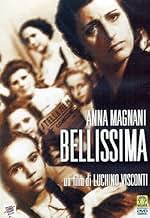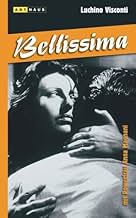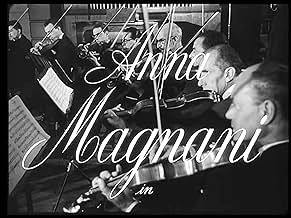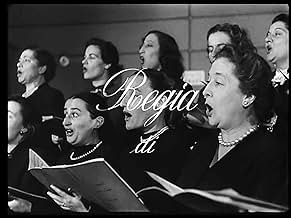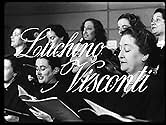Bellissima
- 1951
- Tous publics
- 1h 54min
NOTE IMDb
7,7/10
5,9 k
MA NOTE
Une femme de la classe populaire tente désespérément de faire entrer sa fille dans le monde du cinéma.Une femme de la classe populaire tente désespérément de faire entrer sa fille dans le monde du cinéma.Une femme de la classe populaire tente désespérément de faire entrer sa fille dans le monde du cinéma.
- Réalisation
- Scénario
- Casting principal
- Récompenses
- 1 victoire et 1 nomination au total
Liliana Mancini
- Iris
- (as Iris)
Vittorio Musy Glori
- Self
- (as Vittorio Glori)
Avis à la une
In a post-war Italy, Maddalena Cecconi (Anna Magnani) is a woman from the lower classes abused by her husband Spartaco Cecconi (Gastone Renzelli), who is obsessed to make her young daughter Maria (Tina Apicella) a star in the cinema industry. She expects a better life for Maria, and she sacrifices her marriage and her savings paying interpretation and ballet teachers, dress, hairdresser and bribe for the small time crook Alberto Annovazzi (Walter Chiari) to make her dream come true. When the director sees the test of Maria, Maddalena realizes the reality and cruelty of the entertainment industry.
"Belissima" is a beautiful tale of disillusion. Anna Magnani has a magnificent interpretation in a role of a very poor mother and frustrated woman, spanked by her husband, trying to give a better life for her young daughter. Living nearby a movie theater, she sees the opportunity when a famous director is chasing a young talent for his next movie. Her characters gives the best effort within her short culture and vision trying to make her dream comes true, being very touching the moment when her dreams are shattered. The direction of Luchino Visconti is precise and flawless as usual, and the story is very real and credible. My vote is eight.
Title (Brazil): "Belíssima" ("Very Beautiful")
"Belissima" is a beautiful tale of disillusion. Anna Magnani has a magnificent interpretation in a role of a very poor mother and frustrated woman, spanked by her husband, trying to give a better life for her young daughter. Living nearby a movie theater, she sees the opportunity when a famous director is chasing a young talent for his next movie. Her characters gives the best effort within her short culture and vision trying to make her dream comes true, being very touching the moment when her dreams are shattered. The direction of Luchino Visconti is precise and flawless as usual, and the story is very real and credible. My vote is eight.
Title (Brazil): "Belíssima" ("Very Beautiful")
This is a very small story--a poor woman tries to make her daughter a child movie star--but it has a tremendous, operatic performance from Anna Magnani. Magnani is like all other stage mothers in that the success she desires for the child is really her frustrated ambition for herself (her tiny daughter has no interest in acting, and whines and cries all through the picture), but unlike them in that she never loses her sense of humour. When she realises she has been cheated, instead of becoming outraged, she laughs at her own foolishness, briefly relaxing from her usual blind intensity to become a normal, likable woman.
Her character's desperation to escape her life is understandable when one sees the dump she lives in with her husband and child. The small, dilapidated flat with stained walls, in a building full of fat, sour- faced harpies in hideous housedresses--one never sees such horrors in Hollywood films. Too bad this neo-realism became old-style realism--we could use some of this today as a counter to the candy-floss world we see on TV and in the movies.
One amusing note: The film-struck Magnani says at one point to her husband, "Oh, Burt LanCASter! Molto gentile!" Three years later Lancaster would be playing her lover in The Rose Tattoo.
Her character's desperation to escape her life is understandable when one sees the dump she lives in with her husband and child. The small, dilapidated flat with stained walls, in a building full of fat, sour- faced harpies in hideous housedresses--one never sees such horrors in Hollywood films. Too bad this neo-realism became old-style realism--we could use some of this today as a counter to the candy-floss world we see on TV and in the movies.
One amusing note: The film-struck Magnani says at one point to her husband, "Oh, Burt LanCASter! Molto gentile!" Three years later Lancaster would be playing her lover in The Rose Tattoo.
It was as if I had taken a time machine back to 1951. Sitting at the open theater of Tiberina Island in Rome, Anna Magnani's voice bounced off the ancient angles of this stunning roman spot. "Bellissima" is a timeless masterpiece. A rarity in Visconti's oeuvre. He puts all of his uncanny attention to detail to the service of Magnani's bombastic, tender, funny, extraordinary performance. Visconti knew how to bring the best in his actors. Even Maria Callas who, under Visconti's guidance, went from the greatest Opera singer to the greatest actress singing Opera. There are moments in "Bellissima" that can only be described as a love letter from Visconti to Magnani and vice versa. She has a few close ups that tells us how much love, respect and admiration existed between this two enormous artists. Look at her moments in the mirror, combing her hair naturally, debating under her breath the proper pronunciation of a word. She, not a conventional beauty, looks ravishing. The message about the dangers of immediate fame and fortune could have been written today. If you have a chance, don't miss it. If you love film, it's a must!
'They do not make movies like those anymore' is a saying that makes me smile. Of course, it is true. For the good and for the bad. The technical means, the tastes of the audiences, the style of acting, and many more have changed over the 120 years of cinema history. The reciprocal saying is also true: "Then, they were not making movies like we have today". Also for the good and for the bad. Watching movies like 'Bellissima' makes me think that there also are a few important things that stayed the same. Many viewers, when watching a movie, look for emotions and sincerity, want to see a well-told story, with characters that they understand and identify with. For these viewers, good movies had, have, and will have these qualities. It's the case of Luchino Visconti's 'Bellissima', a 1951 film that succeeds to make us interested and emotional today, because of its cinematic and sentimental qualities, and through the magical acting of the actress around which the film is built: Anna Magnani.
There is a recurrent discussion in Hollywood about the need for strong female roles. Seeing this film and remembering a few other Italian films from the 50s or 60s ('The Nights of Cabiria', 'La Ciociara'), I believe that this discussion must have been entertained many times in history. It is true that Italian cinema has benefited from exceptional actresses such as Giulietta Masina, Sophia Loren, or Anna Magnani. In 'Bellissima' two very popular themes and styles meet: the movies about movies industry, a constant in the cinema history, and the Neo-realism of the Italian cinematography between 1945 and 1960. Maddalena Cecconi, the main heroine of the film, lives in a poor neighborhood of Rome together with her husband and their six-year-old daughter. Both spouses work from dawn to night, but hardly manage to cover the cost of living. Cinema is part of their life, outdoor projections in the inner courtyard of the multi-storey apartments building where they live on rent is both entertainment and existential surrogate, transporting viewers into the imaginary worlds on the big screen. When a competition is announced at the Cinecittà studios for a child role that will be attributed to the most beautiful girl in Rome, Maddalena immediately sees the opportunity to change the life of her little girl, break the economic and social barriers, move her into the dream world. She will be ready to do everything or almost everything to get the little girl succeed, but here she will face another layer of social reality. The world of cinema is far from the ideal that viewers see on screen. It is a world in many ways more ruthless and more unequal than the one of the proletarian neighborhoods. The political convictions of Visconti, one of the most radical Neo-realists, are expressed in this film without hesitations or ambiguities.
The film has many qualities that make it pass the exam of time. The script is very well written, the characters are well drafted forming a true social mosaic, the story does not linger at any moment, and humor is also present, probably in a higher dose than in any other Visconti movie. But above all we have Anna Magnani's fascinating acting performance. She is passionate and obsessed with protecting her daughter, sensual and dignified, she burns on the screen. To emphasize her acting, Luchino Visconti uses an original cinematic technique, and I wonder if a director today would have the courage to adopt it in a contemporary movie: he fixes the camera on the heroine figure, even in motion scenes or in dialogues . Sometimes he seems to have forgotten to change plans, but of course, everything is intentional. Beautiful, expressive, modern! 'Bellissima' is a movie that manages to create emotion, but also an acute social critique directed against the exploitation of children in the film world. And if that was the case, the little girl who played in the film as Anna Magnani's daughter started and ended her acting career with this movie, never to return to act in another role!
There is a recurrent discussion in Hollywood about the need for strong female roles. Seeing this film and remembering a few other Italian films from the 50s or 60s ('The Nights of Cabiria', 'La Ciociara'), I believe that this discussion must have been entertained many times in history. It is true that Italian cinema has benefited from exceptional actresses such as Giulietta Masina, Sophia Loren, or Anna Magnani. In 'Bellissima' two very popular themes and styles meet: the movies about movies industry, a constant in the cinema history, and the Neo-realism of the Italian cinematography between 1945 and 1960. Maddalena Cecconi, the main heroine of the film, lives in a poor neighborhood of Rome together with her husband and their six-year-old daughter. Both spouses work from dawn to night, but hardly manage to cover the cost of living. Cinema is part of their life, outdoor projections in the inner courtyard of the multi-storey apartments building where they live on rent is both entertainment and existential surrogate, transporting viewers into the imaginary worlds on the big screen. When a competition is announced at the Cinecittà studios for a child role that will be attributed to the most beautiful girl in Rome, Maddalena immediately sees the opportunity to change the life of her little girl, break the economic and social barriers, move her into the dream world. She will be ready to do everything or almost everything to get the little girl succeed, but here she will face another layer of social reality. The world of cinema is far from the ideal that viewers see on screen. It is a world in many ways more ruthless and more unequal than the one of the proletarian neighborhoods. The political convictions of Visconti, one of the most radical Neo-realists, are expressed in this film without hesitations or ambiguities.
The film has many qualities that make it pass the exam of time. The script is very well written, the characters are well drafted forming a true social mosaic, the story does not linger at any moment, and humor is also present, probably in a higher dose than in any other Visconti movie. But above all we have Anna Magnani's fascinating acting performance. She is passionate and obsessed with protecting her daughter, sensual and dignified, she burns on the screen. To emphasize her acting, Luchino Visconti uses an original cinematic technique, and I wonder if a director today would have the courage to adopt it in a contemporary movie: he fixes the camera on the heroine figure, even in motion scenes or in dialogues . Sometimes he seems to have forgotten to change plans, but of course, everything is intentional. Beautiful, expressive, modern! 'Bellissima' is a movie that manages to create emotion, but also an acute social critique directed against the exploitation of children in the film world. And if that was the case, the little girl who played in the film as Anna Magnani's daughter started and ended her acting career with this movie, never to return to act in another role!
"Bellissima" is structured in a circular and ephemeral plot. Their conflict, which becomes stronger as a situation, is mimesis of reality, of stories so close and common but diversified. In short: the human desire to overcome poverty, even if we stimulate exploitation even more.
The timeless character of this film made in 1951 by Luchino Visconti, is already clear in its synopsis: The story of Maddalena (a nurse), who inscribes his daughter Maria, in a contest that aims to elect the most beautiful girl in Italy. The contest represents a ticket to give the daughter a life that oscillates between dignity and luxury, being that mother-protagonist, ready to everything to guarantee the victory of the daughter.
In a large part of this story that sometimes takes situations and absurd moments, facing a desire that borders the limitations of vision, rationality and absurdity when showing the starting points, play and finalize this saga. That is drawn by a mother motivated by the future of her daughter, this dramatic dimension that is characteristic to the film, if diluted wisely in moments of comedy. Maddalena's attitudes are laughable, all the more so as in the lack of artistic talent of her daughter. This laughs at the other, the role of a fool that plays this mother not to notice in the daughter who lacks other attributes, and the belief that the beauty of the girl, added to the interference of this mother, as in trying to buy the jurors or get someone inside the Production of the film that highlights the test of Maria, that this sum can interfere in the result and consecrate in the victory of Maddalena through the small daughter.
With all the merits of a timeless story, and without regret the fact that the director had in hand a material very close to the neo-realist films that consecrated him, that is, to have something very close to the style that was customary to do, but that is Rejected in "Bellissima", approaching this story through the realistic bias, in which, personally, I consider that it was desirous to the producers of the film and to the director to present a more comprehensive aspect of the fable, considering the common character of this story, that happens and repeats itself In life, and which is now reflected on canvas, but which, in abandoning a reflection of this realism pertaining to a certain social reality, generates a filmic approach that equates maternal desires, however, disproportionate and invalid in face of class differences and consequently incapable of generating Changes, or results, how can you compete with a family that already has a wide advantage? This inequality of classes is mentioned and treated very superficially in the small plots in which they are presented, this minimizes the strength and potentiality of Visconti and Bellissima, since the approach in which it is presented (its form), makes it impossible for itself speech. The struggle to overcome class differences, through methods that reinforce and contribute to these differences. In truth, the mother does not struggle to overcome anything, she wants only to belong to something, and in the end, when she perceives this world of cruel differences that she admired and in which she ended up collaborating, it becomes, then, the moment of rationality and revolt of Maddalena. In portraying cinema as a microcosm of a prosperous world in advantageous possibilities, Visconti satirizes the film industry itself and human innocence in the face of its belief in possibility and belonging. This belief that induces the ability to use mechanisms, but is already dominated by commercial interests, which among others, result in the strengthening of class differences and simulate a fantasy world, such as the cinema and its benefits.
The entire film is anchored by the magnetic and fascinating performance of Anna Magnani, who fills the entire screen with a fiery vitality and intensity that is almost impossible to look away. In 1951, she was one of the queens of Italian cinema and was already echoing all over the world. Anna was the favorite actress of Bette Davis, and Bette considered Anna's performance in "Bellissima" as: brilliant, uninhibited and full of immense power. There is hardly a moment in the movie where it is still or silent. Visconti, almost exclusively, records Anna in medium and full planes, giving her ample room for compositions and promoting seams from one end of the frame to the other.
Between several scenes of fade-in and fade-out that stitch together the film, between jumps of episodic events that collaborate for the construction and the outcome of the plot, it calls the photographic proposal of Piero Portalupi and Paul Ronald, who basically establish a climate of life Obscure in the apartment of Maddalena, in contrast, the reflectors and dazzle of lights of the "Cinecittà", a directing of light that directs not only the convicted desire of Maddalena, but with only enlightened path that offers a perspective, a way out that life between Shadows Another great moment of mastery of this photograph is in the game between half light that illuminates faces or that highlight one among many others, a clear allusion to the pursuit of brilliance and own light that dialogue and much for the construction of "Beautiful".
Although not the most interesting film of Visconti, and leaving aside many of the brands that have consecrated it, "Bellissima" is an interesting work and that dialogues with the contemporary world, and possibly dialogues with the future world, since between the social differences Which we both struggle to overcome, are often unconsciously reinforced through a selfish struggle that seeks only to save some and not realize that it will only result when we understand the need for a whole. Luchino Visconti was able to write for our eyes, an important social and cultural document that reflects on yesterday, analyzes the present and provides paths for tomorrow.
The timeless character of this film made in 1951 by Luchino Visconti, is already clear in its synopsis: The story of Maddalena (a nurse), who inscribes his daughter Maria, in a contest that aims to elect the most beautiful girl in Italy. The contest represents a ticket to give the daughter a life that oscillates between dignity and luxury, being that mother-protagonist, ready to everything to guarantee the victory of the daughter.
In a large part of this story that sometimes takes situations and absurd moments, facing a desire that borders the limitations of vision, rationality and absurdity when showing the starting points, play and finalize this saga. That is drawn by a mother motivated by the future of her daughter, this dramatic dimension that is characteristic to the film, if diluted wisely in moments of comedy. Maddalena's attitudes are laughable, all the more so as in the lack of artistic talent of her daughter. This laughs at the other, the role of a fool that plays this mother not to notice in the daughter who lacks other attributes, and the belief that the beauty of the girl, added to the interference of this mother, as in trying to buy the jurors or get someone inside the Production of the film that highlights the test of Maria, that this sum can interfere in the result and consecrate in the victory of Maddalena through the small daughter.
With all the merits of a timeless story, and without regret the fact that the director had in hand a material very close to the neo-realist films that consecrated him, that is, to have something very close to the style that was customary to do, but that is Rejected in "Bellissima", approaching this story through the realistic bias, in which, personally, I consider that it was desirous to the producers of the film and to the director to present a more comprehensive aspect of the fable, considering the common character of this story, that happens and repeats itself In life, and which is now reflected on canvas, but which, in abandoning a reflection of this realism pertaining to a certain social reality, generates a filmic approach that equates maternal desires, however, disproportionate and invalid in face of class differences and consequently incapable of generating Changes, or results, how can you compete with a family that already has a wide advantage? This inequality of classes is mentioned and treated very superficially in the small plots in which they are presented, this minimizes the strength and potentiality of Visconti and Bellissima, since the approach in which it is presented (its form), makes it impossible for itself speech. The struggle to overcome class differences, through methods that reinforce and contribute to these differences. In truth, the mother does not struggle to overcome anything, she wants only to belong to something, and in the end, when she perceives this world of cruel differences that she admired and in which she ended up collaborating, it becomes, then, the moment of rationality and revolt of Maddalena. In portraying cinema as a microcosm of a prosperous world in advantageous possibilities, Visconti satirizes the film industry itself and human innocence in the face of its belief in possibility and belonging. This belief that induces the ability to use mechanisms, but is already dominated by commercial interests, which among others, result in the strengthening of class differences and simulate a fantasy world, such as the cinema and its benefits.
The entire film is anchored by the magnetic and fascinating performance of Anna Magnani, who fills the entire screen with a fiery vitality and intensity that is almost impossible to look away. In 1951, she was one of the queens of Italian cinema and was already echoing all over the world. Anna was the favorite actress of Bette Davis, and Bette considered Anna's performance in "Bellissima" as: brilliant, uninhibited and full of immense power. There is hardly a moment in the movie where it is still or silent. Visconti, almost exclusively, records Anna in medium and full planes, giving her ample room for compositions and promoting seams from one end of the frame to the other.
Between several scenes of fade-in and fade-out that stitch together the film, between jumps of episodic events that collaborate for the construction and the outcome of the plot, it calls the photographic proposal of Piero Portalupi and Paul Ronald, who basically establish a climate of life Obscure in the apartment of Maddalena, in contrast, the reflectors and dazzle of lights of the "Cinecittà", a directing of light that directs not only the convicted desire of Maddalena, but with only enlightened path that offers a perspective, a way out that life between Shadows Another great moment of mastery of this photograph is in the game between half light that illuminates faces or that highlight one among many others, a clear allusion to the pursuit of brilliance and own light that dialogue and much for the construction of "Beautiful".
Although not the most interesting film of Visconti, and leaving aside many of the brands that have consecrated it, "Bellissima" is an interesting work and that dialogues with the contemporary world, and possibly dialogues with the future world, since between the social differences Which we both struggle to overcome, are often unconsciously reinforced through a selfish struggle that seeks only to save some and not realize that it will only result when we understand the need for a whole. Luchino Visconti was able to write for our eyes, an important social and cultural document that reflects on yesterday, analyzes the present and provides paths for tomorrow.
Le saviez-vous
- AnecdotesIn the final scene, Anna Magnani hears the film playing outside her room and remarks that she hears Burt Lancaster. Magnani would win an Oscar four years later for The Rose Tattoo, in which she would costar with Lancaster.
- ConnexionsEdited into Al Centro del cinema (2015)
Meilleurs choix
Connectez-vous pour évaluer et suivre la liste de favoris afin de recevoir des recommandations personnalisées
- How long is Bellissima?Alimenté par Alexa
Détails
- Date de sortie
- Pays d’origine
- Langue
- Aussi connu sous le nom de
- Beautiful
- Lieux de tournage
- Ristorante Al Biondo Tevere, Via Ostiense, 178, Roma RM, Italie(Trattoria by the River Tiber)
- Société de production
- Voir plus de crédits d'entreprise sur IMDbPro
- Durée
- 1h 54min(114 min)
- Couleur
- Rapport de forme
- 1.37 : 1
Contribuer à cette page
Suggérer une modification ou ajouter du contenu manquant


